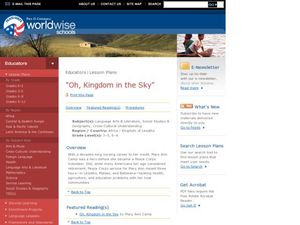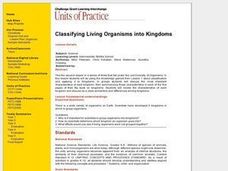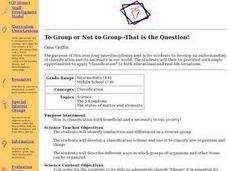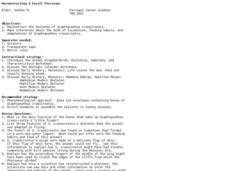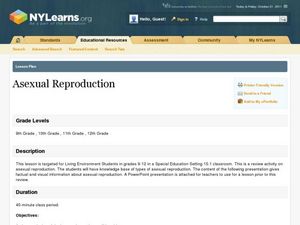Curated OER
Five Kingdoms of Living Things
Fifth graders are introduced to the classification system used in Science. In groups, they explain the characteristics of each of the five kingdoms. After watching a video, they review the life processes of each kingdom and complete a...
Curated OER
Comic Life With Kenzuke's Kingdom
Kenzuke's Kingdom is a wonderful adventure about a boy sailing around the world, it's also the focus of this lesson. Students read the novel as a class then use the Comic Life website to create a two-page comic based on the story. This...
Curated OER
Naming New Species
Young scholars explore science of taxonomy and the Five Kingdoms of life,
categorize organisms into Kingdoms, and create multi-media presentations illustrating knowledge of a Kingdom. They collect data and related pictures on the...
TED-Ed
A Day in the Life of a Mongolian Queen
A four-part instructional activity features a video that details the life of a Mongolian queen. An eight-question quiz, related resources, and discussion questions follow the video to enhance the learning experience.
Curated OER
Kingdom Animalia ~ A Look at the Five Major Classes
Biological taxonomy masters examine the five main classes under phylum chordata. Pupils compare and contrast the identifying characteristics of the various organisms. They explain why taxonomy is important in classifying organisms. You...
University of Hawaiʻi
Taxonomy and Me!
Taxonomy is the study of organisms and how you phylum. Three biology activities are included, helping scholars understand four of the six kingdoms, specifically Protista, Plantae, Fungi, and Animalia. Scholars observe and classify...
Curated OER
Life in Ancient Ghana, Mali, and Songhai
Students study the ancient African kingdoms of Ghana, Mali, and Songhai. They brainstorm what they know about ancient African kingdoms before investigating the trade and barter situations, and researching one of the kingdoms for an oral...
Curated OER
Discovering New Perspectives on Life
Students examine how the author's world view expanded by living in another culture. They discover the three lessons Storti learned as a Volunteer and find out how he learned them and reflect on the enduring understanding: "Living and...
Curated OER
The Origin of Life
In this origin of life worksheet, students write answers to five questions. They describe characteristics of the first life forms and how scientists believe oxygen accumulated in the Earth's atmosphere.
Curated OER
"Oh, Kingdom in the Sky"
Learners write a poem. In this historical figures lesson, students learn about Mary Ann Camp, read an interview, read vignettes about life in her host countries and read her poem "Oh, Kingdom in the Sky." Learners answer questions about...
Curated OER
Classifying Living Organisms into Kingdoms
Students create a flip book that describes the basic characteristics of the five main animal kingdoms. They research the animal kingdoms, include examples of organisms for each kingdom and illustrate the finished text.
Curated OER
To Group of Not to Group - That is the Question!
Upper elementary and middle schoolers use their observation skills to group different kinds of candy by similar characteristics. They debate whether or not we should classify objects. Finally, they learn that biologists have developed a...
Curated OER
Investigating Animals in Soil
Students investigate and observe small animal activity on a plot of land on their school grounds. In small groups they identify the five kingdoms of animals, stake out a small plot of ground, collect samples, record and analyze any data...
Curated OER
Where Do I Belong?
Tenth graders study the diversity of life in the world. They classify and sketch organisms into the 6 kingdoms.
Curated OER
Living in the Black Country
Students listen to someone from the Black Country in the United Kingdom discuss where they live. In this listening lesson plan, students also reflect on where they live.
Curated OER
Reconstructing a Fossil Pterosaur
Students reconstruct the skeleton of the fossil Scaphognathus crassirostis. In this fossil lesson plan, students discuss the Kingdoms of life, geologic history and the history of the skeletons of species. Students are given 20 minutes to...
Curated OER
Inverness and Highlands Heritage box
Students explore, experience and study the rich cultural heritage that Inverness and the Highlands has to offer to young people and takes a look into the future. They assess certain aspects of Highland culture through the expressive arts...
Curated OER
The Six Kingdoms
In this classification worksheet, students complete a chart listing the characteristics of each of six kingdoms. They write definitions for three terms.
Curated OER
The Peaceable Kingdom
Pupils examine the life and works of Edward Hicks. Using his "Peaceable Kingdoms, they create what they believe to be their own peaceable kingdom. They compare and contrast the two kingdoms and practice layering colors with colored...
Curated OER
Classifying Organisms within Kingdoms
Students examine animal kingdom classifications. They discuss how animals are placed into kingdom classifications and compare similarities and differences of animals within a kingdom.
Captain Planet Foundation
Which Plant Is Which?
Learn about dichotomous keys, plant identification, and how to care for the planet with a lesson plan that includes several hands-on and innovative activities. Kids go on a plant scavenger hunt and classify the plants that they find...
Curated OER
Knights of the Round Table adapted by Gwen Ross
Everyone loves the tales involving King Arthur and his knights. After reading Knights of the Round Table by Gwen Gross, learners draw inferences and conclusions, analyze story elements, and discuss figurative language, including...
Curated OER
Korean History Through Journaling
Students explore Korea and details about the Choson Kingdom. In this Korea instructional activity, students examine the geographical location of Korea. Students also take notes on a lecture about the Choson Kingdom and relations...
Curated OER
Asexual Reproduction
Sixth graders investigate how asexual reproduction produces single-parent offspring. They use plants and yeast to demonstrate vegetative propagation and budding in a laboratory. Students draw five different types of asexual reproduction.









